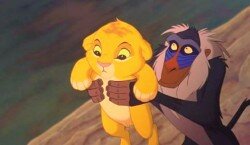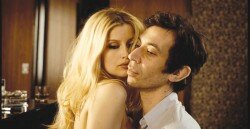Lion King
![]()
Lion King
![]()
Run Time 89 minutes.
OK for children.

“Lion King.”
If there is any activity more boring than watching a full length cartoon, I have yet to be exposed to it. Sitting through a 90-minute cartoon is about as exciting as watching grass grow. In the olden days going to the movies consisted of a double feature sandwiched around a short newsreel and a cartoon, generally a Disney like Donald Duck or A Looney Tunes & Merry Melodies with Bugs Bunny or Elmer Fudd. They were around five minutes in length. Five minutes is fine for a cartoon. Changing the name to “animated” does not justify making a cartoon feature length.
Despite my feelings, Disney made a fortune on this film when it was released in 1994. It was so popular that it was made into a stage play, from which they made even more millions. Now Disney has remastered the original into 3D and rereleased it. It’s still the same film, only now it has the third dimension added.
They needn’t have bothered. The problem with 3D is that when it’s not shot in 3D, but instead remade in post production, is that it mutes the colors terribly. That is what has happened to The Lion King. As I do with most 3D films, I took off my 3D glasses and saw that the colors were much more vivid. Because the third dimension isn’t that pronounced, I think that not only does the 3D add virtually nothing to the film; it actually detracts because the colors are so muted. To make the original, 600 artists created more than one million drawings for the film, which is made up of 1,197 hand-painted backgrounds and 119,058 individually colored frames of film. The addition of 3D mutes the brilliant colors these people created. Why go see a cartoon if not for the gorgeous color that cartoons have always displayed?
As for the content, while this film is apparently aimed at children it seemed awfully dark and depressing, given that the story is that the lion king, Mufasa (voiced by James Earl Jones), is killed by his brother, Scar (voiced by Jeremy Irons), who tries to kill Mufasa’s son, Simba (voiced by Jonathan Taylor Thomas), who flees, but returns as an adult (voiced by Matthew Broderick) finally to triumph. The only performance I really enjoyed is by Rafiki (voiced by Robert Guillaume), a wise shaman baboon, who has the best line in the movie, one that still has me chuckling.
Given my feelings about cartoons, I can’t recommend this. Even if you like cartoons, I would advise sticking with the 2D version. I wouldn’t trade the beautiful colors for the lame third dimension.
Gainsbourg: A Heroic Life
![]()
Run time 122 minutes.
Not for children.

“Gainsbourg: A Heroic Life.”
This film, which starts out well with good titles, quickly degenerates into something that makes one think, “If this is a heroic life, what kind of life would be unheroic?“ Because this film paints Gainsbourg (Eric Elmosnino, who won the 2011 César as Best Actor) as a jerk. Worse, except for his smoking and drinking and some of his many lovers like Brigitte Bardot (Laetitia Casta) and Brit Jane Birkin (Lucy Gordon), with whom he had a 13-year affair, we learn virtually nothing about the man. We don’t know how he wrote his songs; we don’t know if there was any inspiration for them; we don’t know if they came easily or he labored over them; we don’t know how he finally got them recorded or performed; we know nothing. But we do know that he drank a lot, smoked all the time, bedded a lot of beautiful women, and that he was basically an unlikeable jerk. This is heroic?
Elomosnino does a good job of acting, unless he was trying to create sympathy for Gainsbourg. If so, he failed dismally. Casta is a beautiful, believable Bardot. There is quite a bit of nudity, but it is certainly not erotic. The production values are very good.
Unfortunately, the film is psuedo-avant-garde, told by writer/director Joann Sfar (who won a César in 2011 for this as Best First Film) with Serge almost constantly being accompanied by his alter ego, who looks like a hawk-nosed Pinocchio puppet with long, long fingers. It seems like it’s a fantasy. In fact, my companion thought it was fictional. She had never heard of this guy and none of his music was familiar. That might be because it was pretty forgettable. The film is replete with snippets from his songs, but rarely are they played in full. Apparently what he’s most famous for is setting the French National Anthem, La Marseillaise, to a reggae beat, which, according to this film, caused a riot.
Sfar said, “I don’t want to go around delving into his personal life to discover who he really was. I couldn’t care less about the truth.” Sfar did accomplish what he set out to accomplish: He tells virtually nothing about the man and, clearly, what we see here is not the truth. Among the many key figures in Gainsbourg’s life that Sfar left out of the film is Jacques Brel. Juliette Gréco (Anna Mouglalis) and France Gall (Sara Forestier) do appear, but the film is so obtuse that their meaning to his life is muted. There’s apparently a lot to his story, but Sfar didn’t think it important to deal with the “facts” of his interesting life. So what’s the point of seeing the film? In French.
